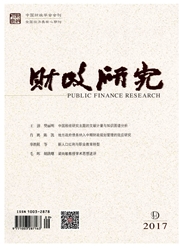

 中文摘要:
中文摘要:
本研究以塑料袋使用限制政策的实行为契机,运用自然实验方法对采用陈述性偏好法(statedpreferencemethods)预测政策效果的外部有效性(externalvalidity)进行检验。在该政策执行前塑料袋均免费时,运用陈述性偏好法调查预测该政策的效果,即在塑料袋被收费的假设情景下消费者对其的预测消费量;在该政策执行后塑料袋实际收费时,再次调查该政策的实际效果,即消费者的实际塑料袋消费量。因此获得了独特的数据以对预测和实际的政策效果进行比较分析。研究表明,运用陈述性偏好法能对实际政策效果提供准确预测。
 英文摘要:
英文摘要:
Chinese plastic bag regulation provides a natural experiment to investigate pre- diction validity of stated preference (SP) estimates on policy impacts. We utilized an SP sur- vey to elicit consumers' contingent bag consumption in a series of hypothetical pricing scenari- os before the regulation. In the regulation regime, we conducted another survey to record ac tual bag consumption. Results indicated that SP techniques predict the impacts of a policy change on consumers' behavior reasonably well.
 同期刊论文项目
同期刊论文项目
 同项目期刊论文
同项目期刊论文
 期刊信息
期刊信息
